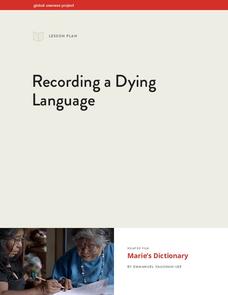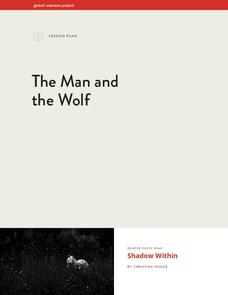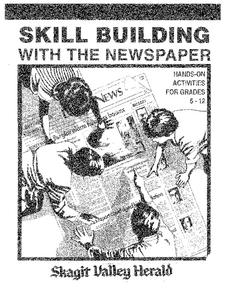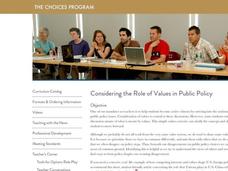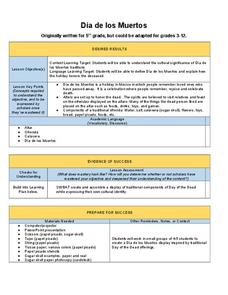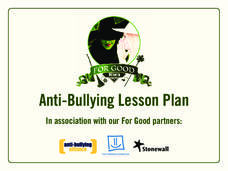Library of Congress
Industrial Revolution
Could you live without your phone? What about cars, steel, or clothing? Class groups collaborate to produce presentations that argue that either the telephone, the gramophone, the automobile, the textile industry, or the steel...
Facing History and Ourselves
Fishbowl Discussion
Filter young teenagers' opinions and perspectives with a classic fishbowl discussion. Given any topic relevant to your curriculum, a group of class members engage in discussion for their peers to observe.
Cloud Front
Socratic Seminar for: A Christmas Carol
Socratic seminars are a great way to encourage the development of critical thinking, speaking, and listening skills. And Charles Dickens' A Christmas Carol is a perfect text for such a seminar. Use the questions in the packet to...
Museum of Tolerance
Improving My Community Through Social Action
Action is the heart of change. Encourage class members to not only identify critical social justice issues in their school or community but to take action as well. As individuals or as groups, they research a situation, develop a...
Global Oneness Project
Recording a Dying Langauge
Is there value in preserving indigenous languages that are almost extinct? That's the question posed to viewers of a short film about the attempt of one Native American woman who is creating a dictionary for Wakchumni, the language of...
The New York Times
The One-Question Interview
Generate interest in current events, the theme of a new unit, or a research project. Individuals select a question from the list generated by the class, conduct one-on-one interviews, analyze the responses, draw conclusions based on...
Gobal Oneness Project
A Tapestry of Multicultural Diversity
New York City is a perfect place to begin a study of multicultural diversity. The largest and the most culturally diverse city in the United States provides the backdrop for a photo essay that features images of cultural and...
Peace Corps
Brief Encounters
How are Pandyas different than Chispas? Explore cultural norms and societal behaviors with an engaging role-play activity. Split into groups of two hypothetical cultural groups, the formal Pandyas and the sociable Chispas, and another...
Peace Corps
Defining Culture
How has culture shaped you? Middle and high schoolers examine different aspects of one's culture, including religious beliefs, social customs, and family traditions, and discuss the ways that their personalities have been formed by these...
Miami-Dade County Public Schools
Veteran's Day—Honoring All That Served
Looking for ideas on ways to recognize Veteran's Day? Check out this 92-page packet that includes exercises designed for all grade levels. Reading passages detail the history of the holiday, research projects get individuals involved in...
Global Oneness Project
The Man and the Wolf
Human attitudes toward the big bad wolf come into focus in a photo essay that asks viewers to consider their own feelings about the endangered species.
Global Oneness Project
Exploring the Creative Process
Launch a discussion of the creative process with a short video that features the daily ritual of Slobodan Dan Paich, a San Francisco artist. Slobodan models his approach to tea painting and shares his reflections on the...
CJ Hatcher & Associates, Inc.
Skill Building with the Newspaper
Extra, extra, read all about it! Use a newspaper as the primary resource in a special education classroom to teach reading, writing, and math skills. The activities help class members build their reading skills as well as their...
Peace Corps
Introducing Culture
Growing up within a culture leaves a lot of ideas and values unspoken. Take a closer look at the cultures in which your learners live with a discussion activity that addresses cultural identity and traits of those living within the...
Peace Corps
Culture is Like an Iceberg
What influences the way you dress, or celebrate holidays, or connect with your friends? Explore the cultural traits that are not easily seen with an engaging discussion. Using the model of an iceberg, learners place features of culture...
Brown University
Considering the Role of Values in Public Policy
Strong opinions come from deeply held values. Young citizens explore the values that are most important to them in a class discussion and activity. As they prioritize a list of values cards that include freedom,...
C-SPAN
Electoral College Pros/Cons and Alternatives
If every vote counts, why do we need the electoral college? Middle and high schoolers study the Constitutional precedent of the electoral college, as well as its place in historical and modern elections, with an engaging social studies...
Idaho Coalition
Teen Relationships
Collaborative activities teach adolescents to talk comfortably about teen issues. Class members identify eight factors of healthy relationships among friends, family, and boyfriends/girlfriends. These factors are then used to help...
Mikva Challenge
The Great Electoral Race Kickoff
Do young people care about elections? Host a discussion about the role of young citizens in the electoral process with an engaging social studies lesson. As high schoolers read and respond to four statements about youth interest in...
Global Oneness Project
Documenting Architectural Heritage
Imagine going from being one of the richest, most important cities in the world to one of the poorest. Imagine the history captured in the architecture of such a city. Imagine these same now abandoned buildings being destroyed. How would...
Vanderbilt University
Dia de Los Muertos
To honor El Dia de los Muertos, scholars work together to create Day of the Dead displays—paper sugar skulls and banners—that bring a festive and memorable flare to the classroom.
Anti-Bullying Alliance
Anti-Bullying Lesson Plan
Wicked is not just a Tony Award winning broadway musical. It also makes for a strong base to teach character education, specifically anti-bullying. Scholars listen, discuss, role play, and show what they know through a group...
Museum of Tolerance
The Role of Citizens in a Participatory Democracy
Groups research participatory democracies and compare the role and rights of citizens in ancient history with those in recent U.S. history. Guided by a series of questions, individuals compose a persuasive essay in which they discuss the...
Museum of Tolerance
Can It Happen in America?: Taking Social Action
Class members investigate the Jim Crow Laws, Executive Order 9066, the Chinese Exclusion Act, and the Indian Removal Act to gather information about not only the challenges encountered by diverse groups of Americans, but their...




